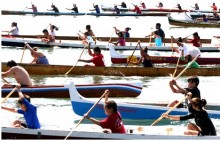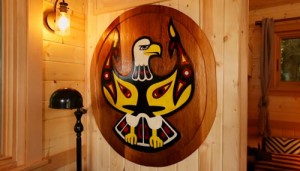— from Lin McNulty —
Today the Seattle City Council unanimously passed a resolution to celebrate Indigenous Peoples’ Day on the same day as the federally recognized holiday, Columbus Day. Columbus Day is not a state-recognized holiday in Washington (RCW 1.16.050), i.e., state offices don’t close down for the day.
Indigenous Peoples’ Day, to honor the contributions and culture of Native Americans and the indigenous community in Seattle, will be celebrated on the second Monday in October.
As reported by ABC News, “This action will allow us to bring into current present day our valuable and rich history, and it’s there for future generations to learn,” said Fawn Sharp, president of the Quinault Indian Nation on the Olympic Peninsula. She is also president of the Affiliated Tribes of Northwest Indians.
“Nobody discovered Seattle, Washington,” she said to a round of applause.
Columbus Day has long been thought by many to be a controversial holiday. Yes, Columbus was a gutsy sailor who set sail to the into unknown waters. And, yes, it was fortuitous that he “discovered” a new land, but his treatment of the natives of that new land was deplorable and not worthy of celebration in any manner whatsoever.
The Bellingham City Council also is concerned that Columbus Day offends some Native Americans. It will consider an ordinance Oct. 13 to recognize the second Monday in October as Coast Salish Day.
In our Salish Sea, the native origins of our islands is both seen and felt. It is time to honor them and be done with the Columbus Day fantasy.
**If you are reading theOrcasonian for free, thank your fellow islanders. If you would like to support theOrcasonian CLICK HERE to set your modestly-priced, voluntary subscription. Otherwise, no worries; we’re happy to share with you.**










I would like to salute Lin for her excellent article. In proposing to move on from Columbus Day to an Indigenous People’s Day, we would be moving away from a celebration of the beginning of the end of Native Americans being allowed to live their traditional lives. Instead we would substitute a celebration of Native American culture and contributions as well as an honest look at the history of the interaction that took place between Native Americans and Europeans (and later European Americans).
While there are some who will bemoan such a change, complaining that many of the stories of people and events that we have traditionally celebrated are being destroyed by political correctness, one needs to realize that very often our traditional historical accounts have only been told from the “great white man” point of view. Current scholarship continues to bring out information that has been left out of traditional historical accounts, and once one finally has access to accounts from many points of view and many different sources, the need for historical revision is clear.
An Indigenous People’s Day would recognize the information that has been traditionally omitted and help us to start coming to grips with an honest account of our history. Once we look at history honestly, we can better understand why we are where we are today, and that should inform us in creating a better tomorrow. We should encourage our Council to seriously consider an Indigenous People’s Day.
Thank you Lin and David for your excellent commentaries. I am with you both 100 percent.
This is the beginning of a movement, long overdue. Let’s help set a trend, and do away with the Columbus myth that we (unfortunately) were all taught in school.
Well said and proposed.
Finally we are starting to make sense! Thank you all and thank you indigenous peoples! Merry